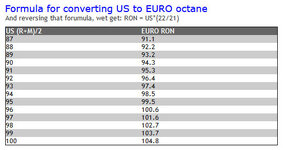Europe and other places use a different standard for octane rating measurement (RON) than the US (R+M/2), that's why the numbers are different, it's not because Europe provides higher octane fuel. (i.e. 87 in the US = ~91 in Europe)In Europe the cheap oil is 95 octane and the Premium is 98... there's no 87...
That's why you can run 1L Engines and get 200,000 miles out of them.
The question is why we have 87 in US and Canada ?
For my LC I used the so-called super premium and premium. No difference although it seems that I get better mileage from the Shell premium.
Manual also states that Gas with Ethanol is OK... but personally I prefer to avoid it as much as I can.
Most fuel sold in the US these days has ~10% ethanol...depending on where you live, it's close to impossible to find ethanol-free gasoline...vehicles sold here have to be able to use it... but there's also "high ethanol fuel", which can be as high 85% ethanol...many, if not most, car engines do NOT recommend using that.



